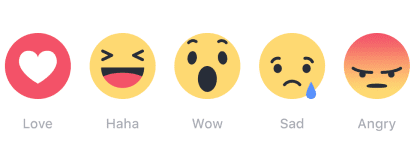Facebook changes the way its algorithm ranks content, weighting reactions higher than likes
Since Facebook introduced new ways to react to posts, with emotions like 'Love, wow and angry' as opposed to the traditional 'like', we've been interested how they affect the way Facebook's algorithm ranks content.
Now Facebook has confirmed that it will be weighting the importance of reactions more than 'likes' when it comes to deciding what posts will be shown to users. Facebook's newsfeed algorithm is extremely important deciding what content gets seen, and generally is far more likely to show a post that is highly engaged with to a large majority of a page's followers compared to one that is failing to drive engagement. This means many brands are trapped in negative cycles, where posts are shown to only a tiny percentage of followers (1% is common), and then they fail to get engagement from that 1%, so they reach no further. This then decreases how well posts from the page are ranked by Facebook's algorithm, so the next post is shown to even less users.

All reactions will be weighted equally, a 'love' will be worth as much as a 'haha' or a 'wow', and all will be judged by the algorithm to be more important than a 'like'. This makes sense, as because it takes longer to use reactions (users have to hold down on the like button to see the reaction menu, then select the reaction they wish to respond with), it is indicative of a greater level of engagement with the post. This in turn suggests the post is more engaging, which means Facebook is more likely to want to surface it higher on newsfeeds to keep it's users engaged.
The implications for brands are obvious- create content more likely to get reactions- funny content will generate 'haha's, negative content may generate 'sad' or 'angry', and shocking content may generate 'wow's. Avoid a focus on bland, generic content and instead aim to generate emotional responses.







